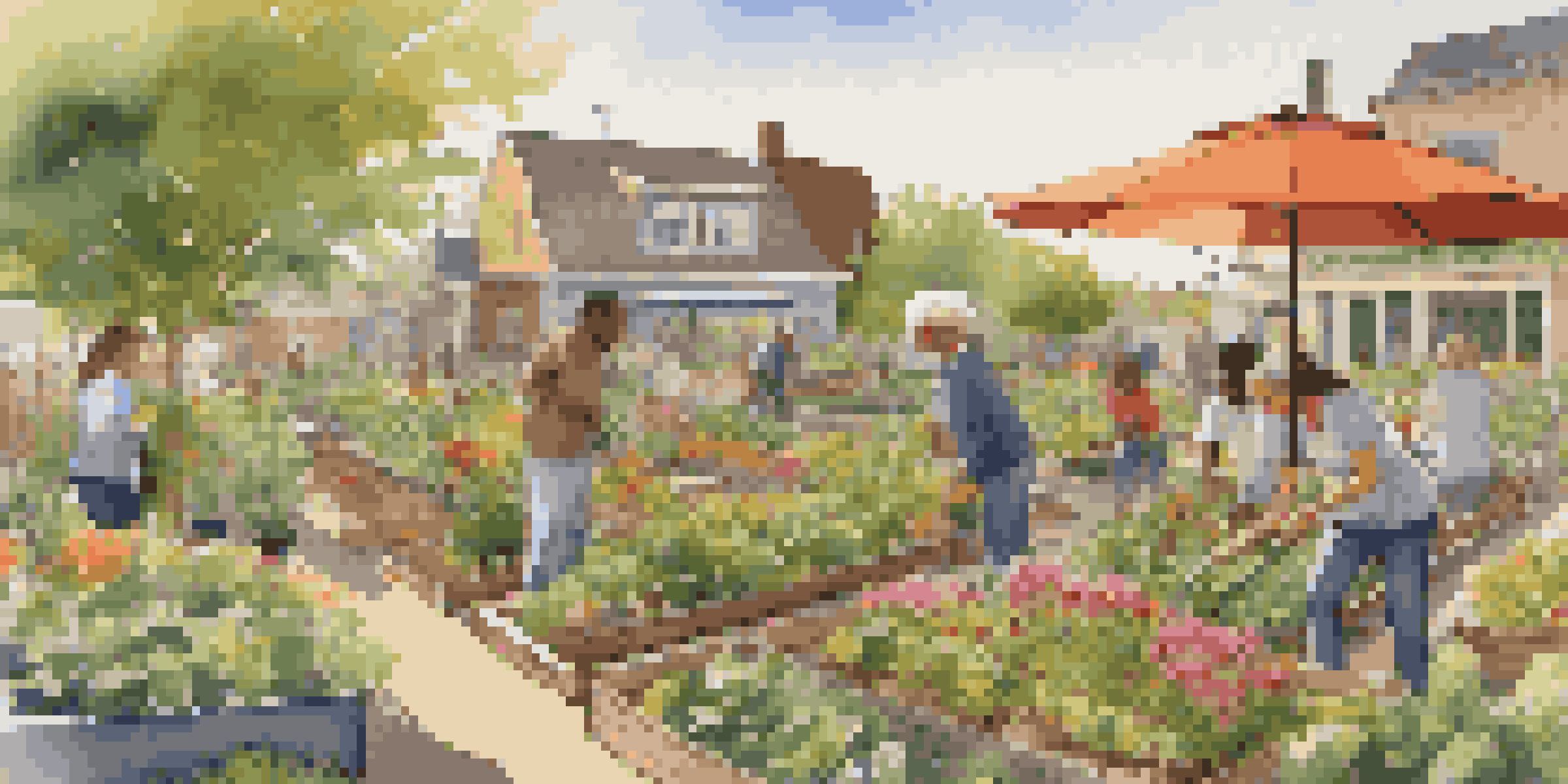The Role of Zoning in Local Food Systems

What is Zoning and Why Does It Matter?
Zoning refers to the laws that dictate how land can be used in a community. These regulations can specify whether an area is designated for residential, commercial, agricultural, or industrial use. Understanding zoning is crucial because it influences where food can be grown, processed, and sold, ultimately affecting local food systems.
Zoning is not just a planning tool; it's a way to shape communities and empower residents to take charge of their food systems.
For instance, if zoning laws restrict agricultural use in certain neighborhoods, it can limit community gardens or urban farms. This restriction can lead to a lack of access to fresh produce, especially in food deserts—areas with limited access to affordable and nutritious food. Therefore, zoning plays a pivotal role in shaping the local food landscape.
Moreover, zoning can support or hinder local food initiatives, like farmer's markets or food cooperatives. By allowing these ventures, communities can foster food security and sustainability, ensuring that fresh food is accessible to everyone.
Zoning Regulations and Community Gardens
Community gardens are a fantastic way to promote local food production, but their existence often hinges on zoning regulations. In many cities, zoning laws have been updated to encourage community gardens, allowing residents to transform vacant lots into green spaces for growing food. These gardens not only provide fresh produce but also foster community engagement.

However, in areas where zoning does not support such initiatives, community gardens can face challenges like eviction or lack of resources. When local governments prioritize these green spaces within their zoning laws, they create opportunities for residents to connect with their food sources and each other.
Additionally, community gardens contribute to urban biodiversity and can even help combat climate change. By designating areas for gardening, cities can enhance their ecological health while also promoting local food systems.
The Intersection of Zoning and Urban Farming
Urban farming is gaining traction as a way to produce food in city settings, but zoning regulations can either support or stifle these efforts. When zoning laws permit agricultural activities in urban areas, it opens the door for innovative practices like rooftop gardens and vertical farming. These methods not only maximize space but also bring food production closer to consumers.
The best way to predict the future is to create it, and that includes our local food systems through thoughtful zoning.
However, if zoning codes are too restrictive, aspiring urban farmers may find it difficult to establish their operations. This can lead to missed opportunities for local food production and economic growth within the community. By revisiting and amending zoning regulations, cities can create a more conducive environment for urban agriculture.
Furthermore, urban farms often serve as educational hubs, teaching residents about sustainable practices and the importance of local food systems. When zoning laws allow for these educational initiatives, communities can cultivate a culture of health and environmental stewardship.
Zoning and Food Deserts: A Critical Connection
Food deserts, areas where residents have limited access to affordable and nutritious food, are often a direct result of zoning practices. When zoning laws favor commercial development over agricultural or community food initiatives, it can exacerbate food insecurity in already vulnerable neighborhoods. This connection highlights the need for thoughtful zoning reforms.
By prioritizing mixed-use zoning, which allows for both residential and commercial activities, communities can promote food access. This approach enables the establishment of grocery stores, farmers' markets, and food co-ops in underserved areas, making fresh food more available to residents.
Addressing food deserts through zoning also involves engaging local stakeholders in the planning process. By including community voices, zoning regulations can be designed to meet the unique needs of each neighborhood, ultimately enhancing food accessibility and equity.
The Role of Local Governments in Zoning
Local governments play a crucial role in shaping zoning regulations that impact food systems. They have the authority to create policies that either support or hinder local food initiatives. By actively promoting zoning practices that encourage community gardens, urban farms, and food markets, they can help cultivate a resilient local food system.
Additionally, local governments can offer incentives for businesses that focus on local food production or distribution. These incentives can take the form of tax breaks or grants, making it easier for entrepreneurs to enter the local food market. Such initiatives not only enhance food access but also stimulate economic growth within the community.
Moreover, local governments can facilitate collaboration between various stakeholders, including farmers, business owners, and community members. By fostering these partnerships, they can create a cohesive strategy that supports sustainable food systems through effective zoning.
Zoning Reforms for a Sustainable Food Future
As the demand for local food systems grows, there is an increasing need for zoning reforms that support sustainability. This involves revisiting outdated zoning laws that may restrict agricultural activities or community food projects. By modernizing these regulations, communities can adapt to changing food needs and preferences.
Reforms can include the introduction of urban agriculture zones, which explicitly designate areas for farming in urban settings. These zones can help alleviate food deserts and promote local food production while also addressing environmental concerns like urban heat islands and biodiversity loss.
Ultimately, the goal of zoning reforms should be to create a more inclusive and equitable food system. By prioritizing local food initiatives in zoning decisions, communities can pave the way for a healthier, more sustainable future.
Engaging Communities in Zoning Discussions
Community engagement is essential when it comes to shaping zoning regulations that impact food systems. Residents should have a voice in the decision-making process, as they are the ones who understand their unique food needs and challenges. By fostering open dialogue, local governments can create zoning laws that truly reflect the community's desires.
Workshops, public forums, and surveys are effective ways to gather input from community members. These platforms allow residents to share their ideas, concerns, and suggestions regarding zoning practices. The more inclusive the process, the more likely the resulting regulations will support local food initiatives.

By actively involving the community, local governments can build trust and ensure that zoning reforms lead to tangible benefits for everyone. Ultimately, this collaborative approach can strengthen local food systems and enhance overall community well-being.